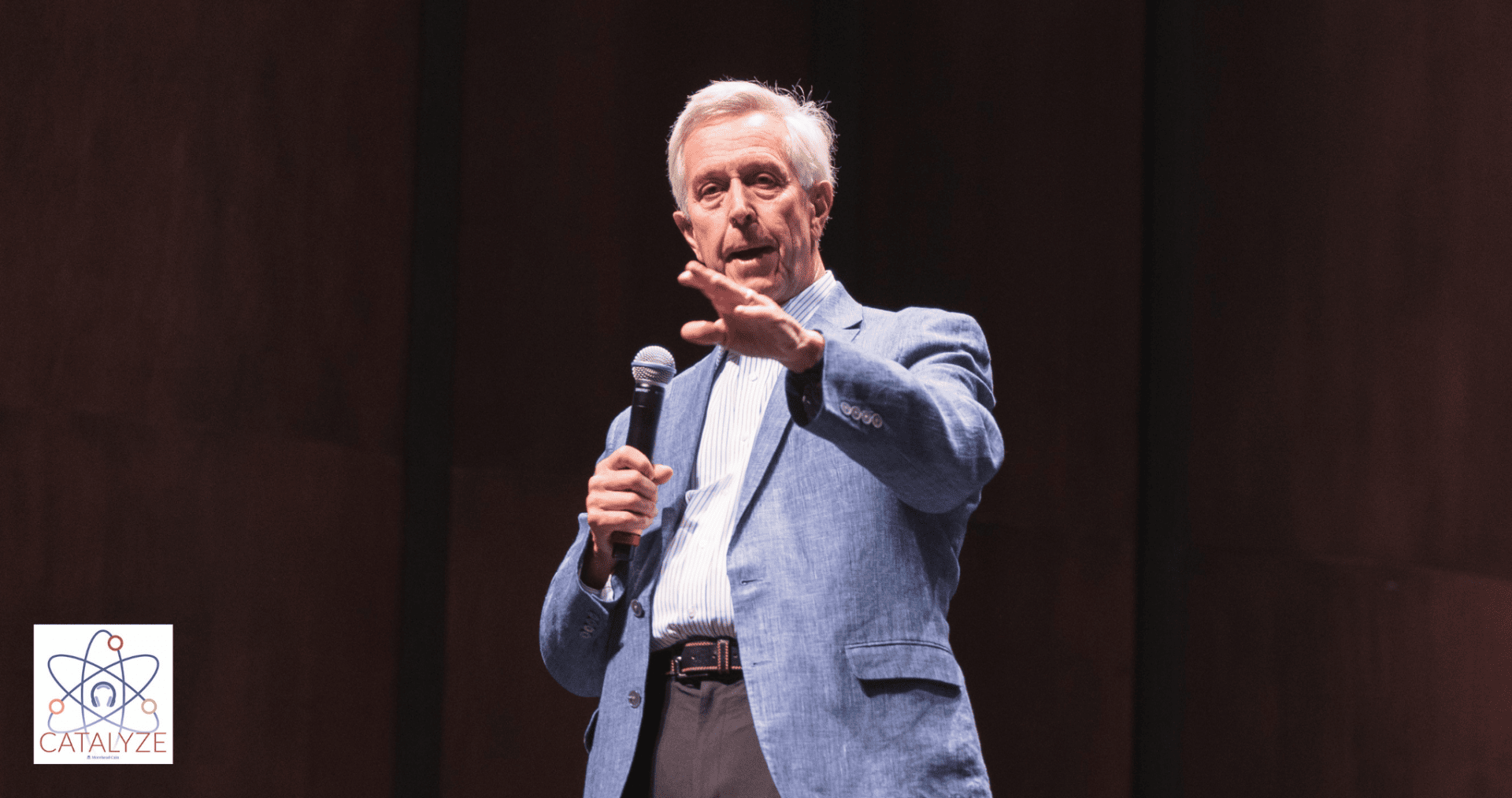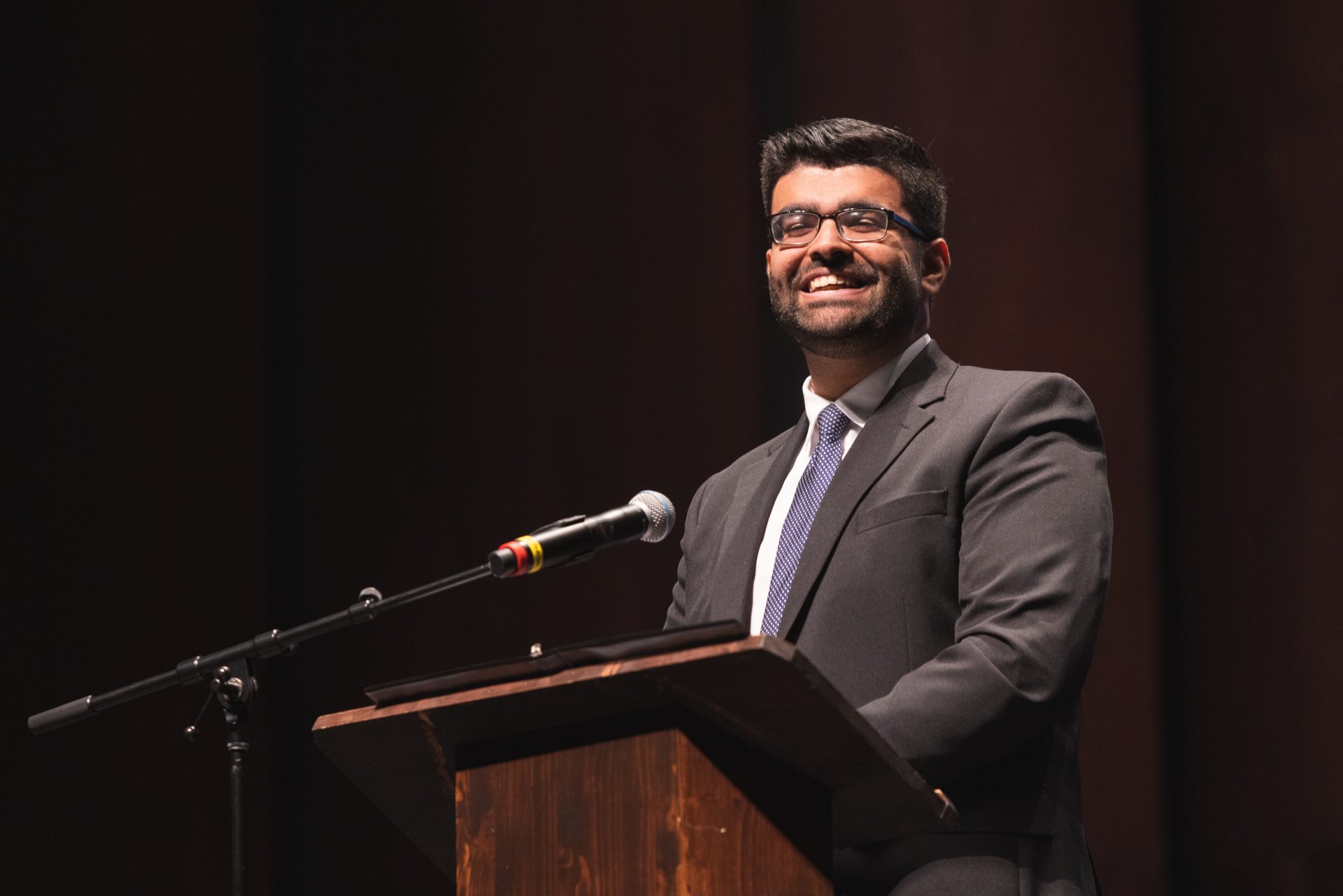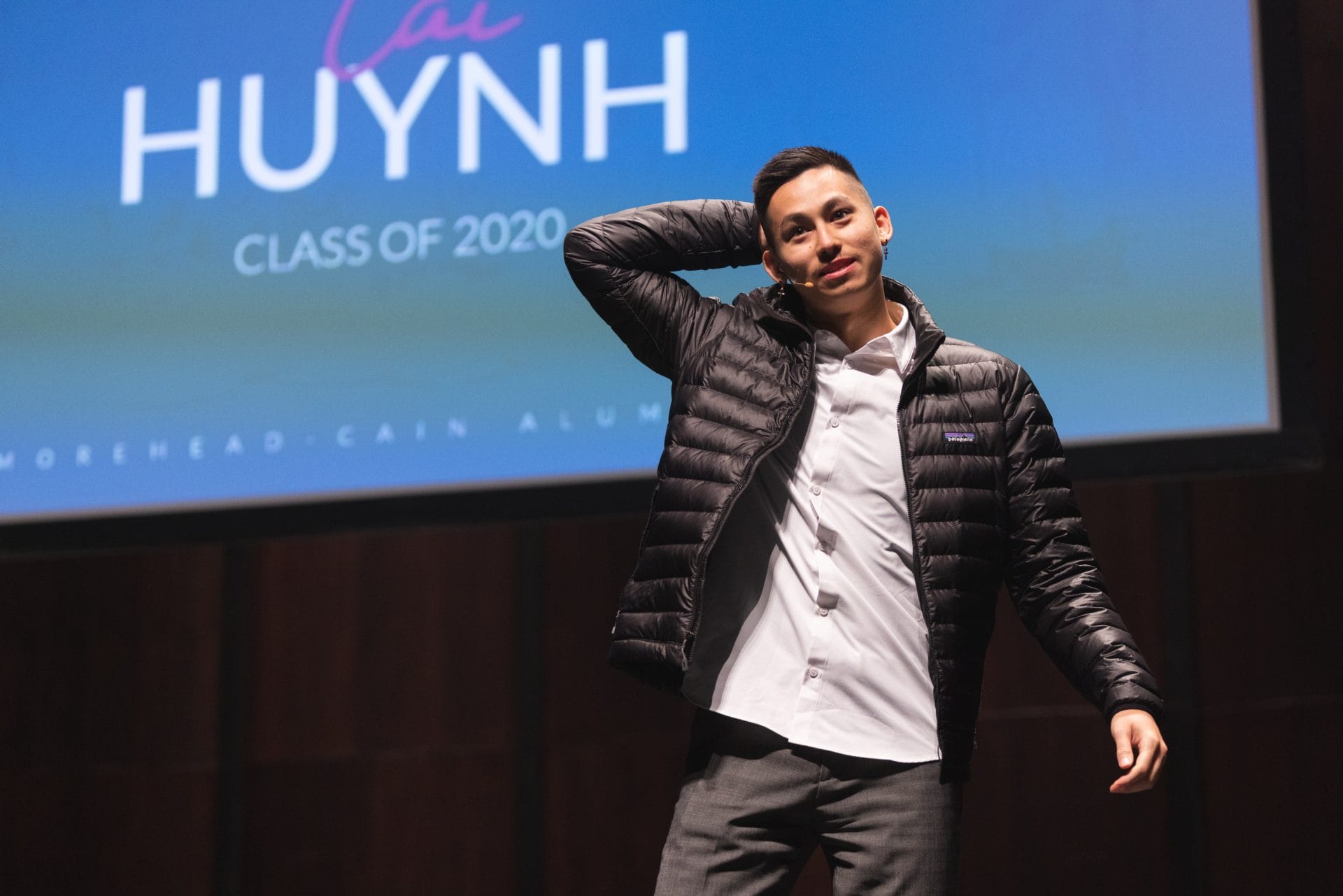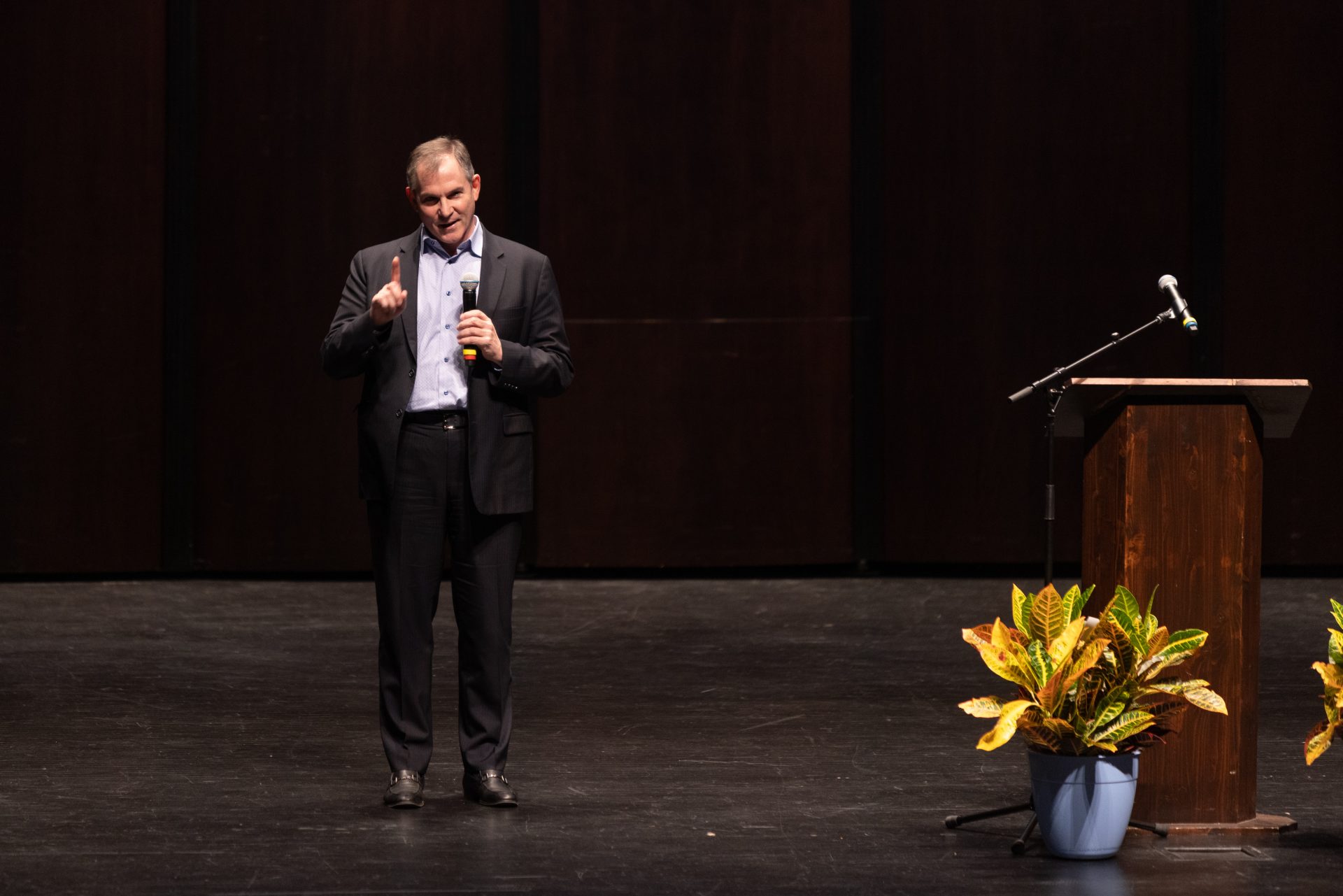
Bruce Gellin ’77 delivering his SEVEN Talk at the 2022 Alumni Forum in Chapel Hill. (Photo by Leon Godwin)
Today’s episode is a recording of a SEVEN Talk from the 2022 Alumni Forum. This talk, given by Bruce Gellin ’77, is entitled, “Serendipitous Lessons.” Bruce is the Chief of Global Public Health Strategy at The Rockefeller Foundation.
You can watch all of the SEVEN Talks on our YouTube channel.
More about Bruce
Bruce Gellin ’77 has pursued a career that’s blended medicine, science, policy, and public health with a focus on infectious diseases and pandemics. He traces all of this to his days at Carolina, where he crafted an interdisciplinary studies program in human biology. When he took a year off in the middle of medical school at Cornell (’83) as a Luce Scholar in the Philippines, he came back with a clearer picture where he was headed.
After completing a residency in internal medicine at Vanderbilt (’86), he became a disease detective in CDC’s Epidemic Intelligence Service that put him on the ground investigating outbreaks from Leavenworth Penitentiary (a foodborne outbreak of “homemade” ice cream) to New Zealand (an epidemic of bacterial meningitis).
His career in vaccines and vaccine-preventable diseases included work at Johns Hopkins and NIH and as a Warren Weaver Fellow at the Rockefeller Foundation. In 2002, he moved to Washington as an Assistant Secretary for Health and Director of the National Vaccine Program Office at the Department of Health and Human Services.
After 15 years in that post (SARS, MERS, Bird Flu, H1N1, and a growing anti-vaccine movement), he was the president of global immunization at the Sabin Vaccine Institute until last year, when he returned to the Rockefeller Foundation as Chief, Global Public Health Strategy, where he is overseeing their Global Vaccine Initiative and their recently launched Pandemic Prevention Institute.
How to listen
On your mobile device, you can listen and subscribe to Catalyze on Apple Podcasts or Spotify. For any other podcast app, you can find the show using our RSS feed.
Catalyze is hosted and produced by Sarah O’Carroll for the Morehead-Cain Foundation, home of the first merit scholarship program in the United States and located at the University of North Carolina at Chapel Hill. You can let us know what you thought of the episode by finding us on Twitter or Instagram at @moreheadcain or you can email us at communications@moreheadcain.org.
Episode Transcription
When was the last time somebody asked you what your major was? When was the last time you thought about selecting that major or declaring it? I mean, it’s an odd word that you would declare it. You don’t just pick it, but you had to declare it. I thought a lot about that when I declared that I would be a zoology major, and I got to that process a little bit convoluted. I think the only concrete piece was I thought I was good in science, but I’d gone through a lot of different things, and I felt like I was out of options. I’d gotten to Z, I had to check a box, and zoology was it.
And then I went to my first class, and it was a shock for me having come from a school with seminar-sized classrooms, now in a class of several hundred eager freshmen. And at the front of the room was a woman in a starch white lab coat writing on the board. That was the era they wrote on the board of the chalk. But the clincher for me about this declaration of a major was when somebody leaned over to me and said, “You know, she’s really famous. She has a cockroach named after her.” I said, “I don’t think that this is the right thing.” And it was time to move on.
You’ll remember that first Thanksgiving when you’re a freshman, you go home, and you’re frantically trying to connect with people. You do it poorly, but you’re trying all the time. And it was on the way back, really by accident, that I bumped into somebody who I hadn’t seen since junior high school, really by accident. And he told me he was at Stanford, which I was surprised about, but nevertheless he was at Stanford. But he also told me about his major. It was a new major at Stanford called human biology. And the philosophy behind it was there are a lot of complex problems out there, and unless you have the perspectives of different disciplines, you’re going to be losing something. So they had put together this interdisciplinary program called human biology—humans, biology, complex things. Two weeks later, in the mail comes his well-thumbed course catalog. So back when they wrote on the blackboard, they had printed course catalogs. People sent things to their mail, a different era. And in it it described the philosophy and the history of the program, laid out all the courses and the professors, the disciplines that they came from, and how they were woven together.
It was more than I expected. I made an appointment to see Mebane Pritchett, and I’m sure that Chuck and Chris have had a lot of meetings like this, where smooth students come in with some big idea. And I told him my big idea that I like to go to Stanford for just a year and try it out. Ever graceful, graceful, ever gracious. He looked at me over his glasses and said, “What you have there is a roadmap. You’ve got a big place here with a lot of resources. I’ll bet you can make it work here.” Goodbye, Stanford; hello, interdisciplinary studies. And in retrospect, while the content of the courses that was woven into this fabric that fit for me was interesting, and really, the process of putting that together was one of those life lessons. First, I had to find advisors who were going to play along with this. The university required signatures, and I had to find people who would actually sign up for this. And that’s where I began to learn about the kinds of professors here who would be engaged in a plot like this beyond what they were doing, but beyond their sort of usual descriptions of things that they had to do way beyond office hours.
And they signed up for it, which is the kind of people who are here, and they didn’t know me, but they liked the idea. Over time, the process was for me to organize monthly meetings. And in retrospect, what was really most interesting about it was I could barely get a word in edgewise with these people because they had big ideas themselves. None of them knew each other. And you could see the conversations that they were having and maybe the conversation, the collaborations that they began. I had four advisors. One from biology, anthropology, psychology, and the School of Public Health. And I’m sure that they are not the only four on this campus who might have played along with us. And I often wonder if it was a different four or some different mix, what advice they might have given that would have led me in some other direction. And the other sort of thing about these advisors was that they really became the first of what I consider accidental mentors—those people who emerge at the right time, at those inflections points in life with the right experience and wisdom to help you think through what your next point is.
The word serendipity was coined in the mid-seventeen hundreds, and it was coined from, inspired by, a fairy tale, the Three Princes of Serendip. Serendip was the old Arabic name for Sri Lanka, and it was a story of the three princes and the accidental discoveries that they found in their wanderings, and finding things that they didn’t expect to see. The definition is the blend of accident and sagacity. Serendipity is a powerful force. It leads to many big ideas and leads to important innovations. The Post-it came about when a three M scientist came up with an adhesive which wasn’t exactly what he was looking for, but it was perfect as a bookmark in his church. Himnal when a hunter came back from the fields, pulled the burs off of his socks, looked at them under a microscope, he saw hundreds of tiny hooks that inspired Velcro. And the famous story of Alexander Fleming, later Sir Fleming, Nobel Prize-winner Fleming, who accidentally discovered penicillin when he returned from vacation. It wasn’t the most meticulous microbiology. He returned from vacation, and his plates were full of this fuzzy mold. Before he threw it out, what he noticed was that where there was mold, there were no bacteria. And that was the development of penicillin.
Serendipity is the invisible force that brought us all here today. James Turner Morehead, John Motley’s father, was an entrepreneur and industrialist. Among his many ideas was to try to develop a process to develop aluminum, which was a rare metal at the time, in the foundry he had in Eden, North Carolina, near a canal. He tried every chemical concoction he could. Every time he opened the door, it was something else but aluminum. And one of these times when he opened the door, it looked a little bit different. It was a glassy rock. But he did what he had done all these experiments before: he shoveled it out, threw it in the canal. But this time something was different. He did a double take. There are now bubbles trickling up from this sunken sludge. Now, the history isn’t perfectly clear here, but you can imagine the conversation. “I wonder what that’s about. Son, you were a chemistry major at UNC. Why don’t you go figure it out?” So young John goes back to Chapel Hill, and the first thing he has to do is find a professor who wants to play along with this idea. That professor’s name was Venable. And because we know it now as a global research institution, the engine of research is really in graduate students. The graduate student who participated in that was named Kenan again. Where would we all be today, and where would those names be today if it weren’t for that interest in the bubbles?
It turns out that this rock was calcium carbide, found later to be helpful to purify steel and was responsible for the growth of the steel industry. The gas acetylene was used initially in streetlights, but then also part of the steel industry in welding and cutting. Again, serendipity is a powerful force. It’s the serendipity that brings us here today. And I think of the forum as maybe intentional serendipity. We come back, we reconnect with people we’ve lost track with. We connect with people we haven’t met before and inspire new conversations, maybe new collaborations. Unclear where it goes. But it’s also a reminder of the time that we were here. Because when we came, we came with some preparation. We had much more preparation. We were here. And we went on because of that preparation to see whatever career paths we had regardless of our major.
And it was interesting because at the same time that the Moreheads were looking at bubbles, that’s really the same time that Louis Pasteur once said, “Chance favors the prepared mind. So in the days, weeks, months, and years ahead, as you think about the path that you’re taking, turn off your GPS every once in a while, and take that road not traveled unless you do it. You’ll never know what’s down there. And when you do, and about the time when you think you’re lost, look for that intersection of accident and sagacity. And if you’re lucky, you’ll know it when you see it.
Thanks.


